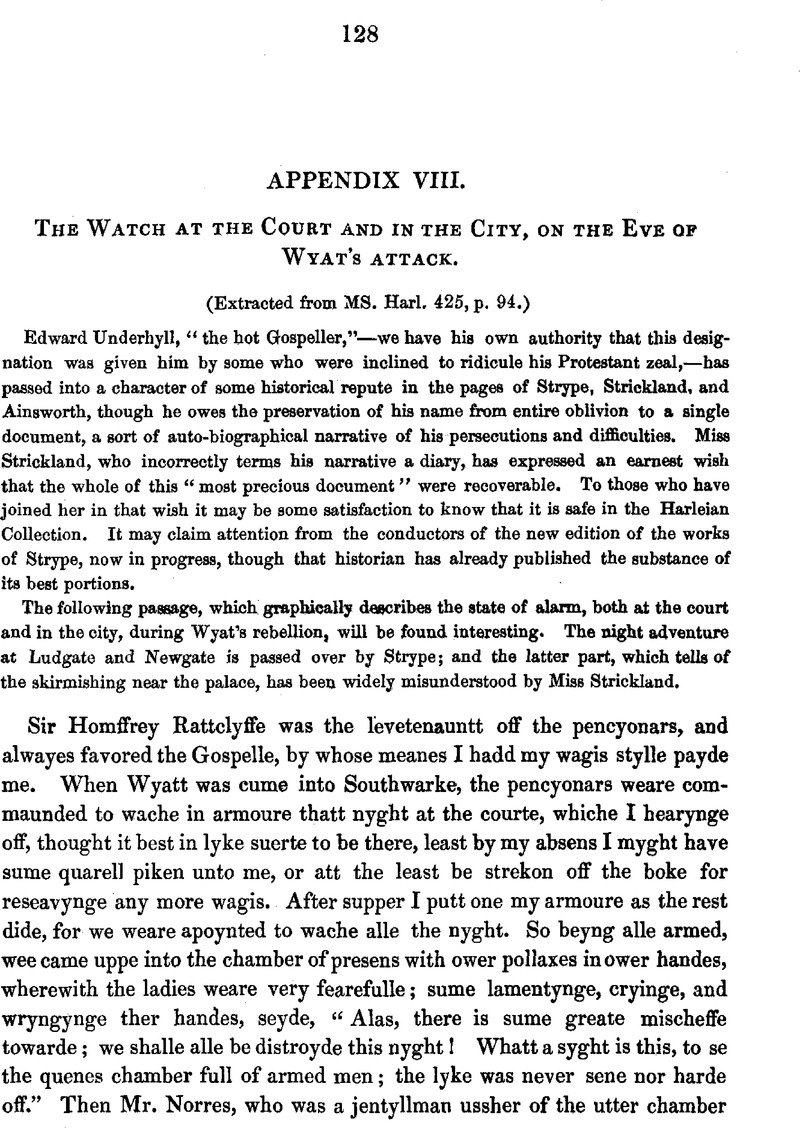No CrossRef data available.
Article contents
VIII. The Watch at the Court and in the City, on the Eve of Wyat's attack
Published online by Cambridge University Press: 23 February 2010
Abstract

- Type
- Appendix
- Information
- Copyright
- Copyright © Royal Historical Society 1850
References
page 130 note a Underhyll had been recently discharged from imprisonment in Newgate, to which he was committed by the privy council, for the contents of a ballad he had “put forth in print” on the queen's accession. See Strype, Memorials, iii. 61.
page 131 note a This is a point which was misunderstood by our chronicler, in the passage at p. 49, beginning, “At Charing erosse there stood the lord chamberlayne,” &c, and also by John Proctor, the person who undertook to be the historian of Wyat's rebellion. The attack on Whitehall did not come from Charing Cross, but from the Westminster side. The former was a natural supposition with those who were not apprised of the exact circumstances j but they are fully explained by Holinshed. The party which threatened the palace of Whitehall was, in fact, the same which our own chronicler describes (p. 48) as “Cutbart Vaughan and aboutij auncyentea,” who “turned downe towards Westminster,” when Wyat's band was first attacked and disjointed near Saint James's palace. Underhyll, i t is Been above, calls their captains “Knevett and Thomas Cobham,” and Holinshed says they were commanded by Knevett. There were two of that name, Anthony and William; and our chronicler seems to say (p. 50), that both Thomas Cobham and William Knevett were arrested with Wyatt at Temple bar. But they may have surrendered at Charing cross. Whoever the leaders of the party were, the facts of the slight attack which they made on Whitehall are very clearly related by Holinshed, who, after describing the charge made by the earl of Pembroke's horsemen near Saint James's palace, adds that “certaine of his companie, which escaped the charge, passed by the backeside of Saint James towardes Westmynster, and from thence to the courte, and finding the gates shut agaynst them, stayed there a while, and shotte off many arrowes into the wyndowes and over into the gardeyne, neverthelesse without any hurt that was knowne. Whereupon the sayde rebelles, over whom one Knevett wascaptaine, perceyving themselves to be too fewe to doe any great feate there, departed from thence to followe Wyat, who was gone before towardes London; and, being on their way at Charing erosse, were there encountered by sir Henry Jerningham captain of the queenes garde, sir Edwarde Bray maister of the ordinaunce, and sir Philippe Parys, knightes, which were sent, by the order of the earle of Pembroke, with a bande of archers, and certaine flelde peeces, for the reskue of the court; who encountered the sayde rebelles at Charing erosse aforesayde, after they had discharged the fielde peeces upon them; joyned wyth those rebelles, halfe armed and halfe unarmed, at the pushe of the pyke, and very soone dispersed theyr power, whereof some fledde into the lane towarde Saint Gyles, and some on the other syde by a brewhouse towardes the Thames. In this conflict, which was the chiefe tryall of that day, there was not founde slayne to the number of twentie of those rebelles, which happened by reason that uppon theyr joyning wyth the queenes souldiours, the one parte coulde not bee discerned from the other, but onely by the myre and dyrt taken by the way, which stacke uppon theyr garments comming in the night; wherefore the cry on the queenes part that day was, Downe with the daggle-tayles.” To this relation Proctor supplies only one additional fact, namely, that while the court gates were open, “one maister Nicolas Rockewod, being a gentleman of Lyncolnes inn, and in armour at the said court gate, was shotte through hys nose with an arrowe by the rebels. For the comminge of the said rebels was not loked for that way.” The Nicholas Rokewode here mentioned adds another name to the list of legal warriors on this occasion (see the note before, in p. 40). His name occurs in the evidences of the Rokewode family as connected with some marriage settlements in 1548, but his place in the pedigree is not assigned to him (Collectanea Topog. et Greneal. ii. 140). a These judges were those of the common pleas. “This daye the judges in the common place at Westminster satte in armoure.”—Proctor.
page 133 note a The anecdote which Proctor gives of Mary's personal conduct at this alarming crisis may he properly appended to the above:—“In so muche divers timerous and coldehearted souldionres came to the queene, crying, All is lost: away, away; a barge, a barge! Yet her grace never chaunged her chere, nor woulde remove one foote out of the house, but asked for the lord of Pembroke, in whom her grace had worthely reposed great confidence. Answere beinge made that he was in the fielde, ‘Well then, (quod hergrace,) fal to praier, and I warrant you we shal heare better newes anone; for my lord will not deceave me I knowe well: yf he would, God wyll not, in whom my chiefe trust is, who will not deceave mee.’ And in dede shortlye after newes came all of victorie, how that Wyat was taken.” Proctor gave the best face he could to the whole affair; but the truer account is evidently that of our own chronicle, which admits that at one time the queen had determined to go to the Tower forthwith (p. 48), whereupon, of course, her barge would be ordered to be in readiness; and also records the suspicion entertained, when the rebels were allowed to pass, that the earl of Pembroke had gone over to Wyat's part (p. 49).




